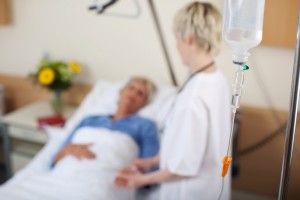 A new Phase II clinical trial showed encouraging results for the targeted therapy of trastuzumab with lapatinib, instead of chemotherapy, for the treatment of breast cancer patients with HER-2 and estrogen positive tumors. The results were recently presented at the San Antonio Breast Cancer Symposium.
A new Phase II clinical trial showed encouraging results for the targeted therapy of trastuzumab with lapatinib, instead of chemotherapy, for the treatment of breast cancer patients with HER-2 and estrogen positive tumors. The results were recently presented at the San Antonio Breast Cancer Symposium.
During 2014, 2.8 million women in the United States were registered as breast cancer patients. HER2-positive breast cancer is one of the most aggressive types of breast cancers and is characterized by cancer cells that express the HER2 (human epidermal growth factor receptor 2) receptor. The HER2 protein promotes the growth of cancer cells and HER2 positive cancers are less responsive to hormone treatment and thus more aggressive therapeutics have to be applied.
Commonly used treatments include trastuzumab, which specifically targets HER2 and is usually combined with aggressive chemotherapy. When patients fail to respond to this combination, another HER2-specific drug, lapatinib, is administered with chemotherapy.
A team of researchers at the Lester and Sue Smith Breast Center at Baylor College of Medicine had previously shown, both in mice and humans, that combining trastuzumab and lapatinib together with endocrine therapy, to treat HER2 positive breast cancer patients resulted in cancer eradication, in both breast and lymph nodes. Specifically, the researchers observed 12 percent of patients responded positively to the therapy, with no evidence of tumor presence in the breast.
In this new clinical study, the team of researchers led by Dr. Mothaffar Rimawi, medical director of the Smith Breast Center, prolonged the treatment for 24 weeks observing that the percentage of patients with a complete response rose to 28 percent.
When researchers looked specifically into the tumors that grew upon exposure to estrogen (ER-positive), the results were even more striking, with a three fold-difference between both groups – the 24-week group showing a complete response in 33 percent of the patients, against 9 percent in the 12-week group. The treatment, however, is efficient only in HER2 and estrogen-positive patients, since the ER-negative groups showed no significant difference in complete response between the 12-week and 24-week treatment.
[adrotate group=”3″]
The results presented were obtained from a new Phase II clinical trial that enrolled 94 patients, followed for a period of 2 years – 33 patients were treated during 12 weeks and 61 were treated during 24 weeks with lapatinib and trastuzumab, administered in combination with letrozole (endocrine therapy) for estrogen-positive tumors. The impact of this treatment was assessed via tumor biopsies collected in the beginning of the trial, and then at 1 week, 12 weeks and at the final surgery.
Dr. Kent Osborne, director of the NCI-designated Dan L. Duncan Cancer Center at Baylor, and the co-director of the Symposium commented in a news release, “This approach needs more clinical study before we can say that some patients can be treated safely with this approach and now we are focusing our research to more clearly define which women do and do not need chemotherapy. This may spare some the cost and toxicity of chemotherapy.”

